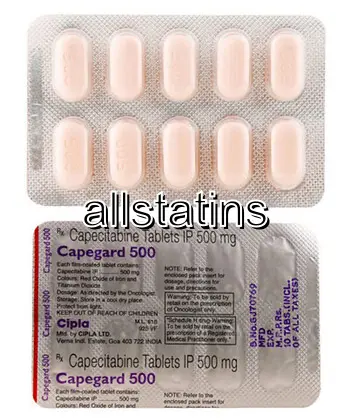Buy Capecitabine Online in the USA at All Statins
| Package | Dosage | Price | Price per Dose | |
|---|---|---|---|---|
| Dosage: 500mg | ||||
| 300 pill | 500mg | $1,883.68 | $6.28 | |
| 200 pill | 500mg | $1,327.54 | $6.64 | |
| 100 pill | 500mg | $690.67 | $6.91 | |

Capecitabine Description
Overview of Capecitabine
Capecitabine is an oral chemotherapy medication used primarily in the treatment of various types of cancers, including breast, colorectal, and stomach cancers. It belongs to the class of drugs known as antimetabolites, which interfere with the growth of cancer cells by disrupting their DNA synthesis. Its design allows it to be administered conveniently in pill form, offering an alternative to intravenous chemotherapy treatments. The drug is generally prescribed by oncologists as part of a comprehensive cancer management plan.
Mechanism of Action
Capecitabine is a prodrug, meaning it is inactive when taken orally and needs to be converted into its active form inside the body. Once ingested, it is metabolized in the liver to produce 5-fluorouracil (5-FU), a potent chemotherapeutic agent. 5-FU then inhibits an enzyme necessary for DNA replication, effectively preventing cancer cells from dividing and growing. Because of this targeted mechanism, capecitabine tends to have a more selective effect on rapidly dividing cancer cells while sparing some normal cells, although side effects are still common.
Benefits of Capecitabine
One of the key advantages of capecitabine is its oral administration, which makes it more convenient compared to traditional chemotherapy delivered via infusion. Its selectivity and oral dosing facilitate outpatient treatment and can improve patient comfort and compliance. Additionally, capecitabine has shown effectiveness in shrinking tumors, delaying disease progression, and extending survival in many patients. It is often used as a first-line therapy but can also be part of maintenance or combination treatment regimens depending on the specific cancer type and stage.
Possible Side Effects
Despite its benefits, capecitabine is associated with a range of side effects. Common reactions include nausea, vomiting, diarrhea, and fatigue. Some patients may develop hand-foot syndrome, characterized by redness, pain, and peeling of the skin on the palms and soles. Blood count abnormalities, such as low levels of white blood cells, red blood cells, or platelets, can increase infection risk and cause fatigue or bleeding issues. In rare cases, severe adverse effects like heart problems or liver toxicity may occur, which require immediate medical attention. Regular monitoring by healthcare providers is crucial to manage these potential side effects effectively.
Precautions and Interactions
Before starting capecitabine therapy, it is important to discuss your full medical history with your doctor. Conditions like kidney or liver impairment, heart disease, or prior allergic reactions can influence treatment decisions. Capecitabine can interact with other medications, including warfarin, which can increase bleeding risk, or other chemotherapeutic agents, which may amplify side effects. Patients should inform their healthcare team about all drugs they are taking, including over-the-counter medicines and supplements.
Usage Guidelines and Recommendations
Capecitabine is typically taken in divided doses, usually twice daily, within 30 minutes of a meal. It’s essential to follow the prescribed schedule carefully and not to alter doses without medical advice. Patients should maintain hydration and report any unusual symptoms promptly. Complete adherence to medical instructions ensures the best possible outcome and minimizes the risk of complications. Regular blood tests and check-ups are necessary to monitor the treatment's effectiveness and detect side effects early.

